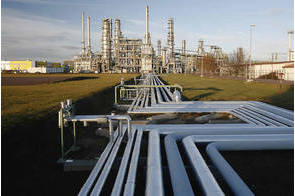Modular refineries: a short-term solution to boost Nigeria’s energy needs and the naira

Summary
While we do accept that the use of modular refineries is still at the infancy stage, there is still a need to provide the required comfort for credible investors and financial institutions willing to sponsor these projects.
A. Introduction
Given the current state of the economy, particularly in light of the drop in Nigeria's Naira value and the falling international market oil prices, it has become absolutely critical for Nigeria as a nation to seek other means of revenue generation and substantially reduce its import portfolio. One of the ways to achieve this objective is to ensure that Nigeria increases its refining capacity such that we are less dependent on the importation of refined crude oil products which currently constitute the bulk of our imports. It is believed that this will put less pressure on the foreign reserves and ultimately boost the value of the Naira. In this regard, the federal government of Nigeria has made moves to license modular refineries for operations in Nigeria.
Accordingly, this article will consider the use of modular refineries as a short-term solution to boost the Naira. However, as explained further below, it must be noted that the use of modular refineries is not a permanent solution and the government must, as a matter of priority, continually explore ways in which output from traditional refineries can be successfully optimized to meet local consumption and international demands. This article will address the use of modular refineries under two major headings as follows:
i. The General Idea of Modular Refineries Significance, Advantages and Obvious Shortcomings; and
ii. The Legal and Regulatory Framework of Modular Refineries in Nigeria.
B. The General Idea of Modular Refineries Significance, Advantages and Obvious Shortcomings
A modular refinery can be defined as a mini refinery which is easier and relatively more cost-effective to build in terms of capital and time than the traditional refinery. Modular refineries are usually available in units from 4,000 to 30,000 barrels per day (bpd) (Cenam Energy Partners) and therefore, have a lower output capacity than the traditional refineries. A modular refinery can also be defined as the processing plant which has been constructed entirely on skid mounted structures – each structure contains a portion of the entire process plant, and through interstitial piping, the components link together to form an easily manageable process (Chemex-modular.com). Simply put, a modular refinery is also an equipment manufactured in controlled conditions, fully assembled and tested prior to overseas shipment, and installed at a client's site in much less time than a traditional refinery. (Sonny Atumah, Vanguadngr.com, October 17, 2015). Given the limited resources available for capital-intensive projects such as refineries, it is no wonder that the idea of modular refineries has been embraced as the short-term solution to meet local demands especially in less developed climes in Asian/Middle East countries. In fact, the relatively low capital cost; speed; and ease of construction have been prescribed as some of the advantages of modular refineries.
However, in order to increase the bankability of the modular refinery projects and attract private sector investments, there are appropriate conditions which must be in place, such as:
i Proximity and access to crude oil products and sizeable markets to decrease transportation and distribution costs;
ii. Access to funds on more favourable and preferential terms, such as longer tenures and reduced equity contributions; and
iii. Availability of government incentives through a well-balanced legal and regulatory framework to promote investments and guarantee returns on investments.
In the next sub-section below, we will consider the extent to which the above conditions have been met in Nigeria. However, it is necessary to mention at this stage that there is generally a poor return on investments made in refineries and this is a major reason why government intervention is ultimately required, either directly (in which case refineries will be public funded and managed) or indirectly (through various government incentives) (Konstantinos Nikolaras, Dundee.ac.uk). Furthermore, the modular refineries are also faced with the challenge of using more staff per Effective Distillation Capacity (EDC) while on the flip side, complex traditional refineries have the advantage of fewer staff per EDC and their efficiency is usually better as they are able to produce more volume and high value products. Therefore, we would advocate that the use of the modular refineries should not be seen as the ultimate solution but as an interim measure which would allow government ample time to strategize on the growth of the refineries.
C. The Legal and Regulatory Framework of Modular Refineries in Nigeria
The Nigerian Department of Petroleum Resources (DPR) recently announced that the federal government of Nigeria had concluded plans to issue twenty-three (23) licenses for investors seeking to establish modular refineries in Nigeria in order to increase local refining capacity, sustainable supplies and to reduce the importation of petroleum products into the country. Indeed, we must understand that investments cannot operate in a vacuum. There is a need to ensure that the appropriate conditions as enumerated above are in place to ensure the viability of these projects. Now, let us consider the current legal and regulatory framework for the establishment of modular refineries in Nigeria. The DPR recently published the Guidelines on the Establishment of Modular Refineries in Nigeria 2015 the guidelines enumerated three licensing stages which must be sequentially followed before a process plant can be commissioned for operations as follows:
i. License to Establish (LTE);
ii. License to Construct the Plant; and
iii. License to Operate the Plant (LTO).
An LTO, whether as a petroleum refinery, petrochemicals and gas processing plant, is valid for just two (2) years. (We are of the opinion that the period prescribed appears insufficient to make good returns on investment).
It must be noted that out of the 18 LTEs which were granted in 2002, only one of such, the Niger Delta Petroleum Resources, is operating the modular refinery which produces automotive gas oil (AGO) popularly known as diesel. (Clara Nwachukwu, Vanguardngr.com, August 28, 2015). This begs the question what happened to the remaining 17 LTEs and why could they not achieve the LTOs stage? Were the appropriate conditions not in place? It is necessary for government to provide an investment-friendly legal and regulatory framework as well as an enabling environment to support investments in modular refineries; otherwise banks will be unwilling to sponsor such projects. (Mkpoikana Udoma, Profigwe.com) Last year, the DPR announced that it had reduced the licensing fee from US$1 Million to US$50,000 in order to woo investors. (Ediri Ejoh , Vanguardngr.com, May 20, 2015). Whilst this gesture may encourage more applicants who can afford the licensing fees (without necessarily having the right track record or financing), the critical issue is in relation to the funding required and some key questions to be raised by potential investors would be:
i. Is the government able to guarantee crude feedstock to the refinery sites as well as ready off-takers for the refined products?
ii. Would government be willing to provide guarantees to backstop their obligations?
Iii. What is the status of the laws to regulate land acquisitions for refinery projects?
iv. What kinds of fiscal incentives would be available for investors? Would they qualify for pioneer status and what would be the process?
v. How would government protect their investment in addressing issues bordering on vandalism and oil theft?
vi. What is the process for the renewal of the License to Operate (which is currently set at 2 years) as investors need to be assured of a license tenure that guarantees a sufficient return on investment?
While we do accept that the use of modular refineries is still at the infancy stage, there is still a need to provide the required comfort for credible investors and financial institutions willing to sponsor these projects. Investors are increasingly unwilling to invest in areas where there are no clear laws and regulations upon which they can make projections.
D. Conclusion
These challenges facing the development of modular refineries in Nigeria are not insurmountable. Once the appropriate conditions and enabling environment have been implemented, it is firmly believed that there would be significant investments in modular refineries. Despite the gloomy statistics on oil prices in the international market, Nigeria has the ready market to absorb the supply based on several factors -- large population of over one hundred and eighty three million, and the consequential energy needs of Nigeria, ranging from transportation to power generation. All things being equal, an increase in the supply of refined products in Nigeria will put less pressure on the foreign reserves and ultimately boost the Nigerian Naira.
Detail Commercial Solicitors is distinct as Nigeria's first commercial solicitor firm to specialize exclusively in non-courtroom practice. Based in Lagos, Nigeria's business capital, DETAIL is totally committed to its clients' business objectives and reputed for dealing with the minutiae.
Related
-
Global clean energy investment drops 14 per cent to $118 billion
A hiatus in renewable energy project deals in China pushed down global investment in H1 2019.
-
Paris-based impact fund makes first investment in Nigeria
With the investment in Rensource, I&P plans to expand its footprint in Anglophone Africa.
-
The energy transition confronts reality
Previous energy transitions unfolded over the course of a century or more, and they did not wholly displace the incumbent ...









